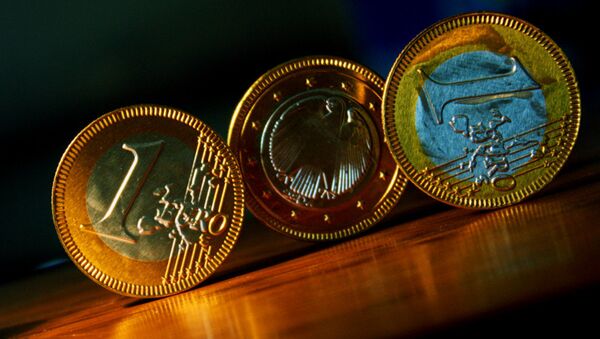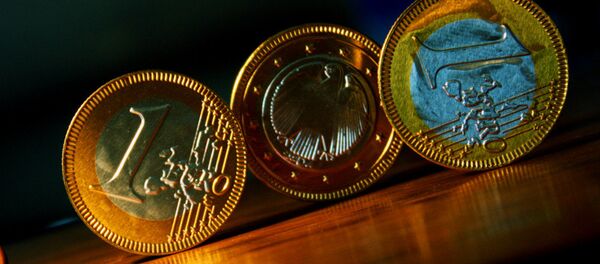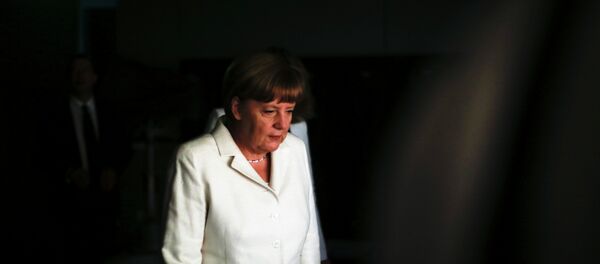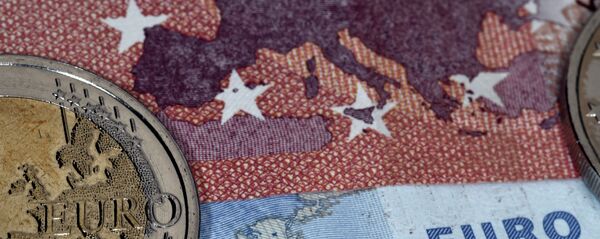MOSCOW (Sputnik), Daria Chernyshova — Stocks in China have experienced a large-scale sell-off and volatility since early July, culminating in the biggest single-day losses in the history of the exchange on Monday. The People’s Bank of China’s (PBOC) on Tuesday cut its rates for the fifth time since November 2014 in another attempt to stem the losses.
CHINESE TURMOIL EFFECT
Increased economic turmoil in the world’s second-largest economy has become a major concern for economists, yet the experts disagree over the effect it might have on the eurozone.
"I think the impact is overstated. China is still growing relatively rapidly. Its consumers enjoy rising incomes," Randall Wray, professor of economics at the University of Missouri-Kansas City told Sputnik on Wednesday.
He stressed that in the short-term, the eurozone will still enjoy positive growth in Chinese demand. Yet taking a longer view, Wray believes that the eurozone "faces huge problems — some of their own making, and some that have to do with movement of jobs abroad."
He explained that the falling asset prices in China and other Asian economies will have an adverse effect on aggregate demand in these regions.
"Due to the asset price effect on individual wealth, private demand in China is likely to fall. As a consequence, Chinese production is likely to go down and with it the demand for investment and intermediate goods," Bauer told Sputnik.
Chris Beauchamp, senior market analyst with IG, a UK-based company, also commented that "with so much European output going to China, a drop in demand is going to make life much more difficult for European economies."
READY FOR ANOTHER CRISIS?
With the markets’ partial recovery on Tuesday, there is no clear answer to whether the eurozone can handle another shock, as it is still suffering the after effects of the 2008 financial crisis.
"The EZ [eurozone] has proven itself incapable of responding to crisis. The only thing we can say that is positive is that some within the EZ have come to realize that the EZ as a structure cannot respond to crises," Randall said.
Bauer, on the other hand, says "there is no cause to fear another financial market crisis in the eurozone." He underlined that the economic fundamentals have not changed dramatically in the recent weeks and months.
"The markets are likely to recover. Yet, we are likely to see a re-assessment of the robustness of the world economy that will be mirrored in less enthusiasm about the upside potential of European stocks for the rest of the year, and lower asset prices, respectively," Bauer said.
Beauchamp agrees, citing the example of Greece as proof that "the eurozone, and in particular the ECB, is much better prepared for any crisis than it was 2 or three years ago."
Nevertheless, Randall believes that the euro itself is not a sustainable system and will ultimately implode.
"While it looks like we have a Greek problem, we actually have an EZ problem. Country after country will face attacks until finally the center — Germany — cannot hold," Randall said.
WHO’S AT FAULT?
The chief of the People's Bank of China's Research Institute of Finance said Wednesday that the global market nosedive this week was triggered by expectations of a US Federal Reserve rate hike next month, while many argue that the slide was caused by slowdown in China.
"There are several factors that came together: the Fed’s announcement to leave the path of zero interest rates, the sluggish growth of important emerging markets economies like China and Brazil, but also the Russian (and Ruble) crisis, and not least the burst of the asset prices bubble in China," Bauer said.
He stressed that the turmoil in China has been intensively debated in recent months, if not years, well before the Fed carefully announced its exit from low interest policies at home.
Beauchamp said the news from China was "one of those shocks that no one really expects, and thus the reaction has been dramatic." While the Fed’s policy move "remains a key question, but this is a more a question of adjustment, rather than a fundamental problem."
WHAT’S NEXT
The European economists believe that the eurozone economic growth will increase by the year-end, with Bauer saying that "the path of eurozone growth rates should remain unaffected, at least for the rest of 2015." He says that many businesses are still optimistic about incoming orders and revenues.
"I expect a steady improvement in economic growth in the eurozone, barring any resumption of the Greek crisis, even as China falters – the improving eurozone economy benefits from growth in the US as well, to make the situation look more optimistic," Beauchamps agrees, adding that though the equities look unfavorable at the moment, the year-end should see stocks higher than they are now.
On a pessimistic note, Randal says the eurozone should not expect Santa Claus to come to town. He explains that politics trump all decisions right now, "and the politics of the "winners" (mainly Germany) dictate forcing more austerity on all the losers (approximately four-fifths of all the members)."
"This will not end well. Eventually it will drag down Germany too — as her markets stumble. And there is no way German workers can win the eventual race to the bottom — against the east and far east," he said, foreseeing more disappointing growth for the eurozone.
In late July, the International Monetary Fund (IMF) announced that the euro currency zone would grow by an estimated 1.6 percent a year in the medium term. The IMF warned that eurozone growth prospects were below what is needed to reduce unemployment to acceptable levels, opening the region's economy up to negative shocks and extended low growth.






